外研版(2019)选择性必修第一册Unit2 Onwards and upwards Using Language 语法课件 (共14张PPT)
文档属性
| 名称 | 外研版(2019)选择性必修第一册Unit2 Onwards and upwards Using Language 语法课件 (共14张PPT) | 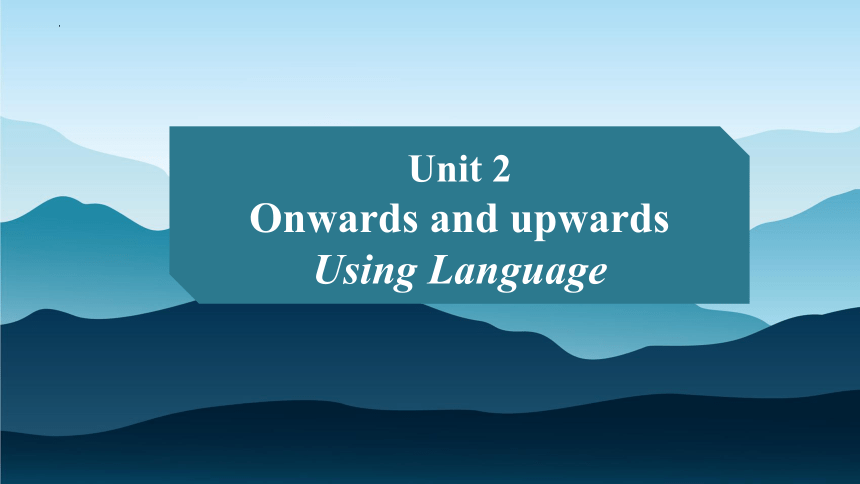 | |
| 格式 | pptx | ||
| 文件大小 | 3.4MB | ||
| 资源类型 | 教案 | ||
| 版本资源 | 外研版(2019) | ||
| 科目 | 英语 | ||
| 更新时间 | 2023-09-21 20:03:48 | ||
图片预览

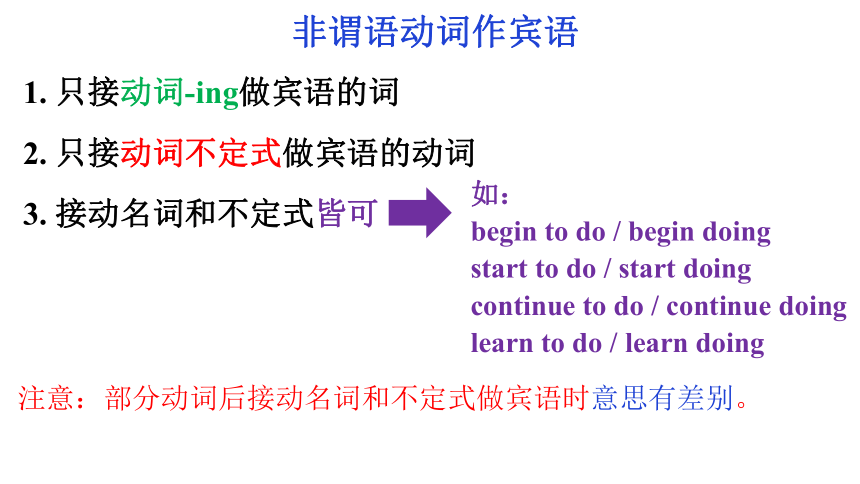
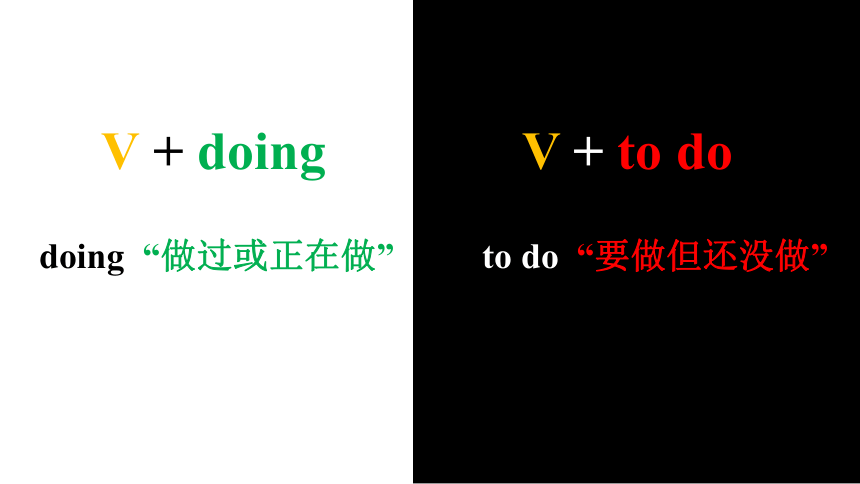
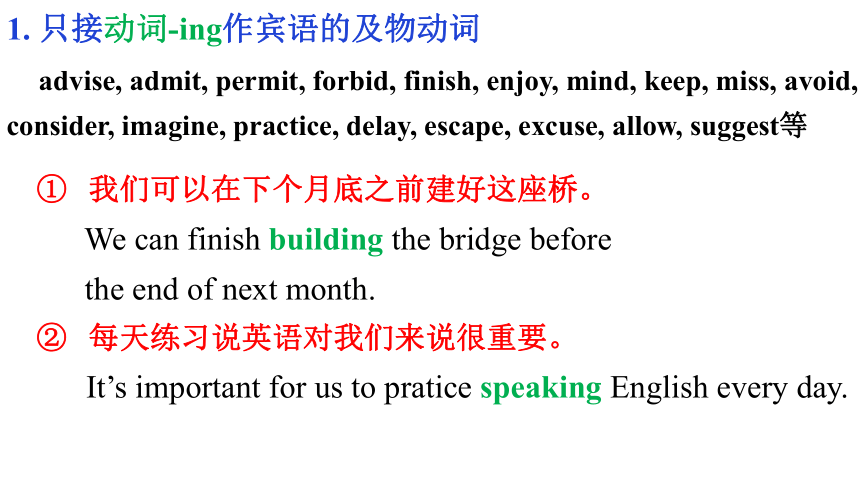
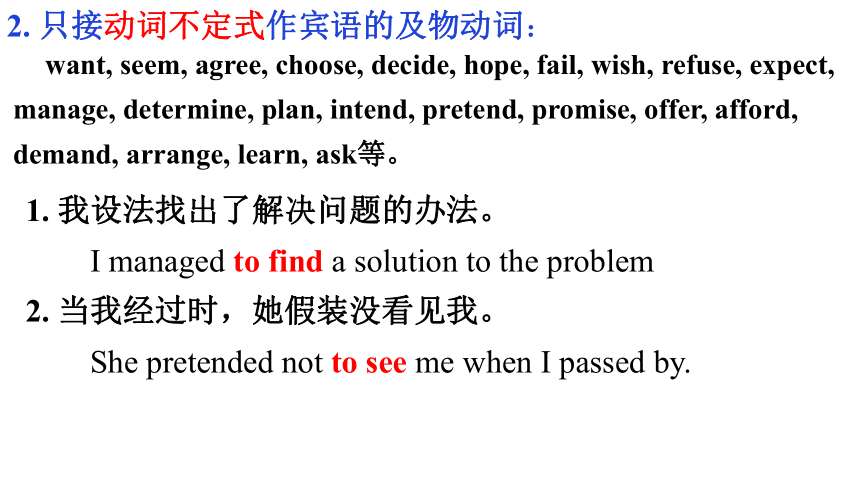
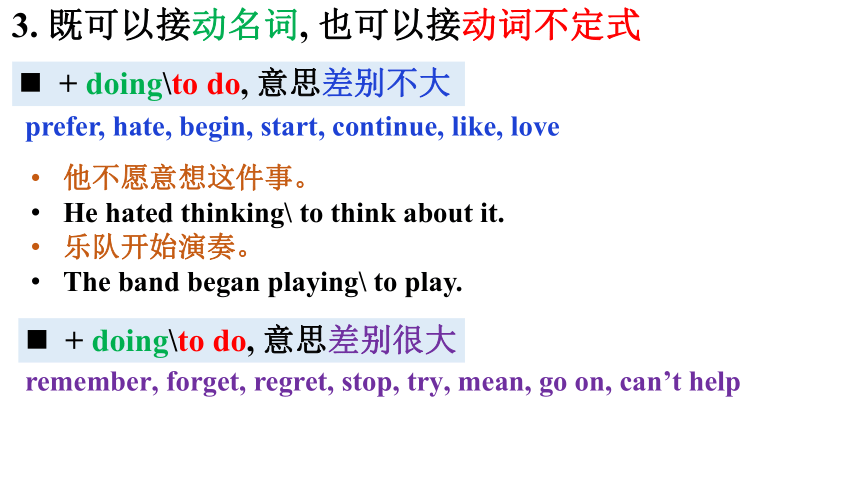
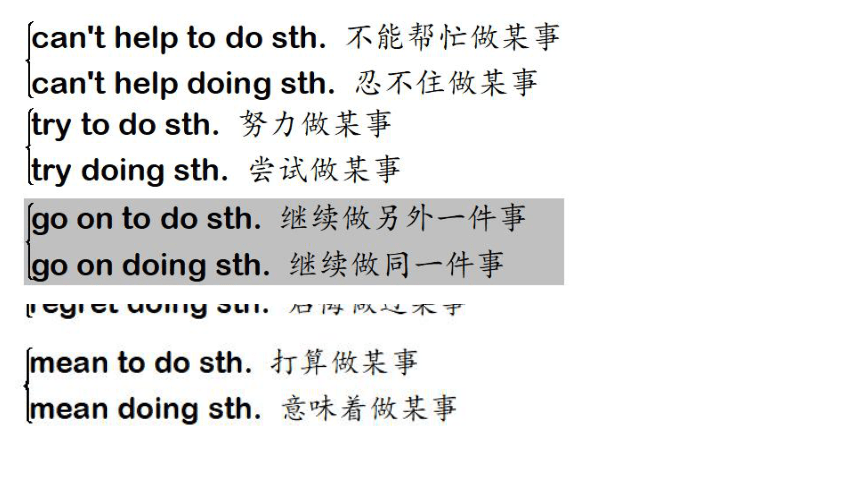
文档简介
(共14张PPT)
Unit 2
Onwards and upwards
Using Language
1. 只接动词-ing做宾语的词
2. 只接动词不定式做宾语的动词
3. 接动名词和不定式皆可
注意:部分动词后接动名词和不定式做宾语时意思有差别。
如:
begin to do / begin doing
start to do / start doing
continue to do / continue doing
learn to do / learn doing
非谓语动词作宾语
V + doing
V + to do
doing “做过或正在做”
to do “要做但还没做”
1. 只接动词-ing作宾语的及物动词
advise, admit, permit, forbid, finish, enjoy, mind, keep, miss, avoid, consider, imagine, practice, delay, escape, excuse, allow, suggest等
我们可以在下个月底之前建好这座桥。
We can finish building the bridge before
the end of next month.
每天练习说英语对我们来说很重要。
It’s important for us to pratice speaking English every day.
2. 只接动词不定式作宾语的及物动词:
want, seem, agree, choose, decide, hope, fail, wish, refuse, expect, manage, determine, plan, intend, pretend, promise, offer, afford, demand, arrange, learn, ask等。
1. 我设法找出了解决问题的办法。
I managed to find a solution to the problem
2. 当我经过时,她假装没看见我。
She pretended not to see me when I passed by.
3. 既可以接动名词, 也可以接动词不定式
+ doing\to do, 意思差别不大
prefer, hate, begin, start, continue, like, love
他不愿意想这件事。
He hated thinking\ to think about it.
乐队开始演奏。
The band began playing\ to play.
+ doing\to do, 意思差别很大
remember, forget, regret, stop, try, mean, go on, can’t help
need, want, require, deserve等动词后面跟动名词的主动形式和动词不定式的被动式都表示被动意义。如:
The scientist deserves respecting.
=The scientist deserves to be respected.
注意
你的房子需要修理。
这个科学家值得被尊敬。
Your house needs repairing.
= Your house needs to be repaired.
Exploration
Mr Green is showing how_________ ( learn ) English well.
They think it difficult __________ ( finish ) the work in such a short time.
I believe it an easy job for you ________ ( get ) up early every morning.
I think it no use ____________(discuss) the matter again.
用括号内动词的适当形式填空。
to learn
to finish
to get
discussing
1. Vt.+ “疑问词+动词不定式” 常见的动词有tell, understand, show, teach, learn, decide, wonder, discuss等。
2. 6-1-2-3 结构即“主语+动词+it+宾语补足语+to do / doing ”。
常见的动词有believe, think, consider, make, feel和find等。
Practice
After he finished _________ (do) maths homework, he went on ______________ (write) a composition.
I regret ________ (tell) you that you are not invited to the meeting.
I require him ____________ the trees, because they require ___________________________ in this hot weather. (water)
I feel it my honor ____________ (make) friends with you.
I think it no use ___________ (argue) over the matter with him again.
We think it necessary ______ we read English aloud every day.
doing
to write
to tell
to water
watering/ to be watered
to make
arguing
that
Complete the passage with the correct form of the verbs in brackets.
At the age of ten, Liu Wei lost both his arms in an accident. Despite this, he wanted 1 ________ (live) life to the full. He learnt 2 ______ (use) his feet for everyday, such as eating and brushing his teeth. He also started 3 ___________________ (swim) and won two gold medals at the National Games for People with Disabilities.
to live
to swim / swimming
to use
When he had to stop 4 ___________ (swim)due to health problems, he decided 5 ________ (learn) how to play the piano with his toes. It was difficult, but he kept 6 ___________ (practise) until he had achieved his goal. In 2010, he won in China’s Got Talent and became famous nationwide. Today, Liu Wei still enjoys 7 ________ (play) music, and his positive attitude is an inspiration to us all.
playing
practising
swimming
to learn
Translation:
1. 我很荣幸能代表我们学校在开学典礼上讲话。
It is my great honor to deliver a speech at the opening ceremony on behalf of our school.
2. 你们学校的活动怎么样 期待您的分享。
What about activities in your school Looking forward to your sharing.
3. 他们知道善良和给予的重要性。
They know the significance of kindness and giving.
Unit 2
Onwards and upwards
Using Language
1. 只接动词-ing做宾语的词
2. 只接动词不定式做宾语的动词
3. 接动名词和不定式皆可
注意:部分动词后接动名词和不定式做宾语时意思有差别。
如:
begin to do / begin doing
start to do / start doing
continue to do / continue doing
learn to do / learn doing
非谓语动词作宾语
V + doing
V + to do
doing “做过或正在做”
to do “要做但还没做”
1. 只接动词-ing作宾语的及物动词
advise, admit, permit, forbid, finish, enjoy, mind, keep, miss, avoid, consider, imagine, practice, delay, escape, excuse, allow, suggest等
我们可以在下个月底之前建好这座桥。
We can finish building the bridge before
the end of next month.
每天练习说英语对我们来说很重要。
It’s important for us to pratice speaking English every day.
2. 只接动词不定式作宾语的及物动词:
want, seem, agree, choose, decide, hope, fail, wish, refuse, expect, manage, determine, plan, intend, pretend, promise, offer, afford, demand, arrange, learn, ask等。
1. 我设法找出了解决问题的办法。
I managed to find a solution to the problem
2. 当我经过时,她假装没看见我。
She pretended not to see me when I passed by.
3. 既可以接动名词, 也可以接动词不定式
+ doing\to do, 意思差别不大
prefer, hate, begin, start, continue, like, love
他不愿意想这件事。
He hated thinking\ to think about it.
乐队开始演奏。
The band began playing\ to play.
+ doing\to do, 意思差别很大
remember, forget, regret, stop, try, mean, go on, can’t help
need, want, require, deserve等动词后面跟动名词的主动形式和动词不定式的被动式都表示被动意义。如:
The scientist deserves respecting.
=The scientist deserves to be respected.
注意
你的房子需要修理。
这个科学家值得被尊敬。
Your house needs repairing.
= Your house needs to be repaired.
Exploration
Mr Green is showing how_________ ( learn ) English well.
They think it difficult __________ ( finish ) the work in such a short time.
I believe it an easy job for you ________ ( get ) up early every morning.
I think it no use ____________(discuss) the matter again.
用括号内动词的适当形式填空。
to learn
to finish
to get
discussing
1. Vt.+ “疑问词+动词不定式” 常见的动词有tell, understand, show, teach, learn, decide, wonder, discuss等。
2. 6-1-2-3 结构即“主语+动词+it+宾语补足语+to do / doing ”。
常见的动词有believe, think, consider, make, feel和find等。
Practice
After he finished _________ (do) maths homework, he went on ______________ (write) a composition.
I regret ________ (tell) you that you are not invited to the meeting.
I require him ____________ the trees, because they require ___________________________ in this hot weather. (water)
I feel it my honor ____________ (make) friends with you.
I think it no use ___________ (argue) over the matter with him again.
We think it necessary ______ we read English aloud every day.
doing
to write
to tell
to water
watering/ to be watered
to make
arguing
that
Complete the passage with the correct form of the verbs in brackets.
At the age of ten, Liu Wei lost both his arms in an accident. Despite this, he wanted 1 ________ (live) life to the full. He learnt 2 ______ (use) his feet for everyday, such as eating and brushing his teeth. He also started 3 ___________________ (swim) and won two gold medals at the National Games for People with Disabilities.
to live
to swim / swimming
to use
When he had to stop 4 ___________ (swim)due to health problems, he decided 5 ________ (learn) how to play the piano with his toes. It was difficult, but he kept 6 ___________ (practise) until he had achieved his goal. In 2010, he won in China’s Got Talent and became famous nationwide. Today, Liu Wei still enjoys 7 ________ (play) music, and his positive attitude is an inspiration to us all.
playing
practising
swimming
to learn
Translation:
1. 我很荣幸能代表我们学校在开学典礼上讲话。
It is my great honor to deliver a speech at the opening ceremony on behalf of our school.
2. 你们学校的活动怎么样 期待您的分享。
What about activities in your school Looking forward to your sharing.
3. 他们知道善良和给予的重要性。
They know the significance of kindness and giving.
